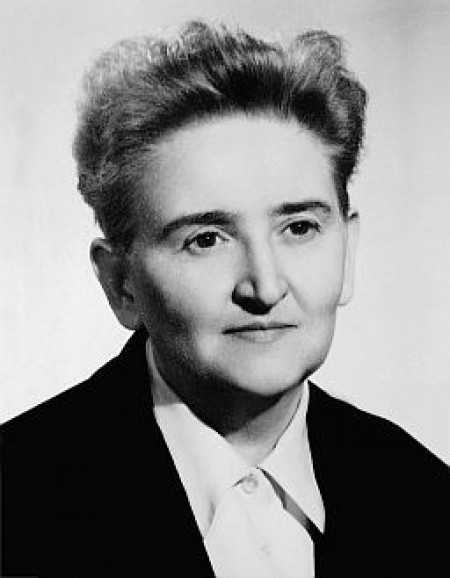
9 April 1904, Pécsvárad – 18 July 1977, Budapest
The rapid development – one could say today: overflow – of music recordings release led to a period when all the self-respecting domestic children's and women's choirs record the works of the most significant Hungarian composers of the 20th century (Bartók, Kodály and Bárdos). Now from the several high quality performances still excel those few discs containing the ‘Zoltán Kodály Female Choir's' interpretation of the well or less known compositions of the composers' mentioned above with Ilona Andor conducting. What is the purpose of these ‘old' recordings' great effect on the listener, despite all their sound technology disabilities? The secret lies in Ilona Andor conductor's suggestive personality, tireless, patient and very demanding coaching, and the beautiful and pure sounding of the choir. Ilona Andor was committed to serve primarily the music, the community, the choir during her more than four decades long artistic and pedagogic career, when she dedicated all her time and strength to her students and music, giving up the idea to have her own family.
She was born at Pécsvárad in 1904 as the ninth child of a low class family. The talented young girl, becoming an orphan soon, planned to be a pianist, she taught piano at the Town Music School in Pécs in 1927/1928 (according to other sources from 1922 already). She worked in the capital from 1929: in the same working place during her whole life, the Ranolder Teachers' Training Institute, that was named later as the Vendel Street Institute and then the Leővey Klára High School. She was assistant conductor first besides Romána Csorda Sister (whose name was linked to the premiere of several choral works of Kodály), and was urged by her to register to the high school class singing teachers' training department of the Academy of Music in mid 1930s, where she became a student of Lajos Bárdos, Arthúr Harmat and Arnold Székely, among others. She earned her degrees in choral conducting and piano in 1937 at the Apponyi College, as well. She became first conductor at the Ranolder Institute in 1948, and taught class singing lessons in the twelve-grade school of the institute. Her insisting on her work place (despite all the name and attitude changes) shows the commitment and endurance that was characteristic to her whole life. ‘All that she was working with, she could imagine just as being perfect, in that she did not know any barriers or compromises. She conveyed this standard -set by herself- to all those around her with such a radiative power, that made everybody to do their maximum.' – as one of her students wrote about her. Her strictness, boundless diligence and consistency were combined with lots of love, caring and infinite modesty. Generations keep her advice: ‘we all matter together and only together.' It is certainly not accidental that several of her students chose music and pedagogy as a career. Ilona Andor scattered her spiritual treasures restlessly among her students, and expected no appreciation for that. The greatest acknowledgement for her was the honorable attention Zoltán Kodály paid to the life of the school and the choir. The choir of Ilona Andor could be the first to be named after Zoltán Kodály in 1949. Many choral works of the Master was premiered by this ensemble, and the particularly nice and difficult choral piece titled Árva vagyok (I am an Orphan) Kodály dedicated ‘To the hands of Ilona Andor'. Probably it was by his advice that the choir could travel abroad. From the first journey in 1955 they returned immediately with a great appreciation: their singing won first prize at the WFDY in Warszaw. They were invited by Benjamin Britten to the Aldebourgh Festival in 1965, where the Columbia Recording Company made recordings with them (in the presence of Zoltán Kodály). This recording was awarded an Edison Prize later. The acknowledgement from abroad soon lead to receiving awards at home, as well: she was awarded Liszt Prize in 1954, Service Medal for Socialist Work in 1955, Artist of Merit Award in 1963, and Distinguished Artist Award in 1972. The choir succeeded at the Choir Festival in Linz in 1968 and at the ISME conference in Moscow in 1970. Each one of these performances was preceded by incredible effort and work. That is the reason for which one can feel ‘the revelation of perfection and purity at every sound of this choir' – as István Raics esthete highlighted at the memorial service of Ilona Andor in 1977.
D. Á.


